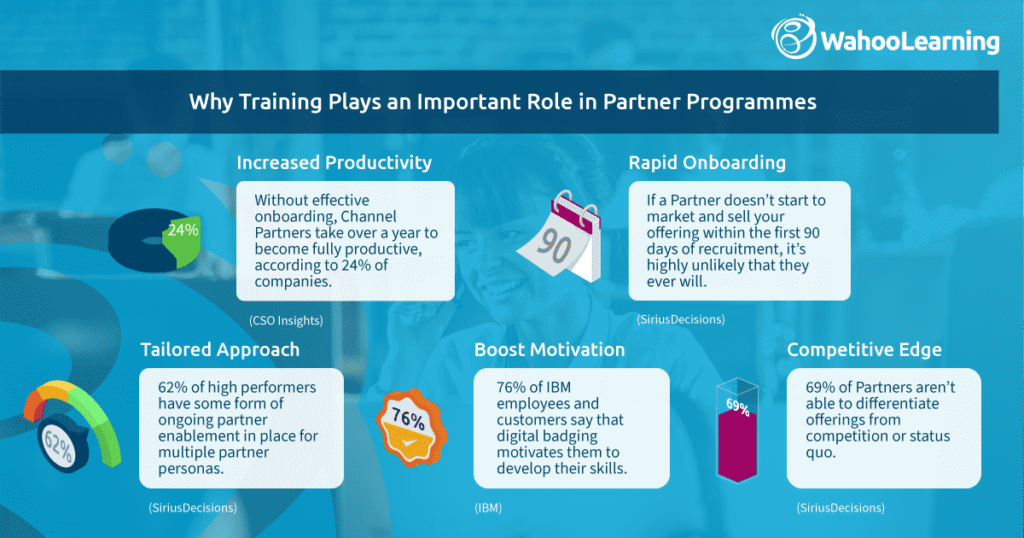A channel partner network is a sales approach that offers fantastic opportunities to increase your reach and penetrate new markets. The success of your channel partners is a shared success, but like all partnerships, it takes effort to ensure they are effective. But how do you keep your channel partners motivated?
For them to succeed and for them to remain motivated, they need to be given the right tools, whether this is the first time you partnered with them (e.g. passing on product knowledge, providing sales information, effective onboarding) or you’re nurturing the relationship you have with long-term partners.
However, that relationship shouldn’t stop at sales, marketing and technical support for the partner itself. Consideration should also be given to the engineers and installers that install, support, maintain, and test your products.
Motivating your channel partners also means you maintain your competitive edge. Bear in mind that there’s a good chance they are supplying products from your competitors. Providing partners with support and offering them the opportunity to gain a better understanding of your products promotes more successful sales.
With a well-nurtured partnership comes a strong sales relationship, leading to a natural promotion of your product over others.
In this article, I want to dive deep into motivating your channel partners, based on what I have seen in our two decades of working with businesses across several sectors.
Seven Proven Ways to Motivate Channel Partners
There are several ways to motivate your channel partners, but the biggest strategies that will make a difference are these:
1. Align your goals
The first and perhaps the most critical way to motivate your channel partners is to ensure you align goals from the offset. Working together to achieve shared goals and respecting and supporting partners’ individual objectives creates strong relationships. Your partners will be more likely to become highly motivated, high-performers as they understand they have partnered with a business that cares about their success.
Powerful, long-term partnerships, which are well-nurtured, lead to increased sales. Your partners will naturally promote your products over others.
So, to keep your partners motivated, keep your goals aligned and ensure goals, expectations and achievements are communicated effectively.
2. Develop an online training program
You can build a program around motivating your partner network by developing an online training program, ideally through an experienced training service provider.
Through its processes and features, a well-structured training program enables you to deliver a consistent, efficient, responsive, and proactive program with the partners. Some of the key areas to cover are:
- Sales training
- Product training
- Technical training
- Incentive programs
- Marketing support
- Dedicated web training portals
- Feedback on training status through the review process
- Dedicated partner communications and events
- End user and market promotion of the training program
In addition to training, extensive marketing resources are often made available to partners to help promote their training and certifications. This can include:
- Communication of partner status information on public websites
- Web partner locator
- Certification on approval
- Promotion of partner program to end-users
- Full range of channel-ready support, sales, and marketing collateral
When creating your training program, it’s always worth considering charging for your training as the revenue from this can help recoup the investment you made for creating the program in the first place.
This also has the added benefit of incentivising your partners to complete the training. Pricing psychology comes into play here as people tend to think paid-for items have greater value than those that are free. Generally speaking, if someone pays for something, then it becomes a premium product in their mind and they’re much more likely to engage with it.
3. Introduce a tiered system
Another tried and tested technique for motivating channel partners is using what we call partner segmentation. One common example of this is a tiered partner network. For instance, you could introduce a ‘Platinum Partners’ tier for your top sellers.
If you structure your program that sees the partners progress through a tiered system, it gives everyone in your network an incentive to want to succeed. You can then link your training to your tiers—that is, to become a top-tier partner, they have to have a certain level of training within their organisation. This then tells you that they’re vested in you as an organisation, they’re knowledgeable about your products, and they have the technical expertise to install and support your products.
4. Provide certification incentives
Badges and certifications provide your partners with a vested interest in completing your training courses.
On our learning management system, for instance, we have bespoke, customisable digitised certification and qualification badges. They look similar to an ID badge and include the student’s photograph and the qualifications they have achieved. By using the accompanying app, students can then quickly and easily access the badge whenever it’s needed. They can also share those badges on social media like LinkedIn or Facebook to show which qualifications they’ve gained.
For the partner, this gives proof of knowledge and potentially a competitive edge.
5. Communicate frequently and keep them up to date
This is about having a good line of communication and maintaining multiple touchpoints between yourself and your partners. Be responsive to their questions, their wants, and their needs. Make sure that your communication channels are open and frequent.
Training helps with knowledge transfer, so make sure you get all relevant information to your partners and keep that up to date. It’s all well and good to set up a partner training program with the best intentions of distributing all the information, but if that’s not kept up to date, frustration can quickly creep in and jeopardise the relationship.
If you’re giving them outdated information, then there’s a chance that they’re going to look foolish if they’re out selling your products. Their reputation, and yours, will suffer as a result.
6. Offer high-level support
Businesses that spend time supporting partners, training partners and helping partners to reach individual goals have a clear edge over those that don’t.
Support comes in several forms, from regular check-in calls to full-blown marketing/promotional solutions. Ensuring you cover most bases, including marketing material, value-driven training courses and competitor insight. This type of support will lead to heightened confidence amongst your partners and, ultimately, higher sales levels.
The best thing you can do is make sure your partners know your door is always open. Make sure they understand your commitment to success and always help to break down any barriers they may come across.
Of course, a partner will prefer to work with a vendor that offers full support and cares about success!
7. Track and report progress
Keeping an eye on pre-determined KPIs ensures everything remains on track. It also allows spotting gaps and feedback on successes – both of which encourage partners to sell more and feel motivated by better understanding their place in the sales ecosystem and how they contribute to the overall successes.
Monitoring progress and offering regular feedback provides a clear and transparent relationship and offers the opportunity to upsell and take advantage of increased engagement.
Summary
Channel partner programs keep the supply chain running seamlessly. However, keeping your network motivated can sometimes be a challenge. For programs to truly work, you need to offer the right motivation. This is where well-executed training programs can help.
It’s important to keep your goals aligned and effectively communicate expectations and achievements back to your channel partners.
Using techniques like partner segmentation (tiers) and certification is a powerful way of motivating but, ultimately, for the best results, it pays to develop an online training program with an experienced training provider like Wahoo Learning, who can bring their experience to bear, monetise your training and keep your courses up to date.
Are you eager to take your channel partner program to the next level and ensure partner success? Check out our latest blog post, “How to Ensure Channel Partner Success,” to discover practical tips and strategies for building a partner program that drives success
Want to learn more about channel sales? Read our free, comprehensive guide today to discover everything you need to know about channel sales.











